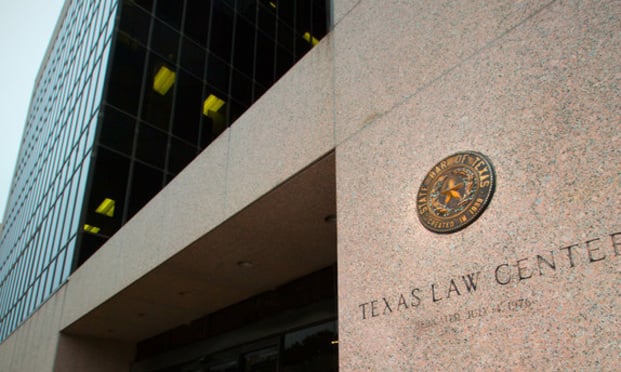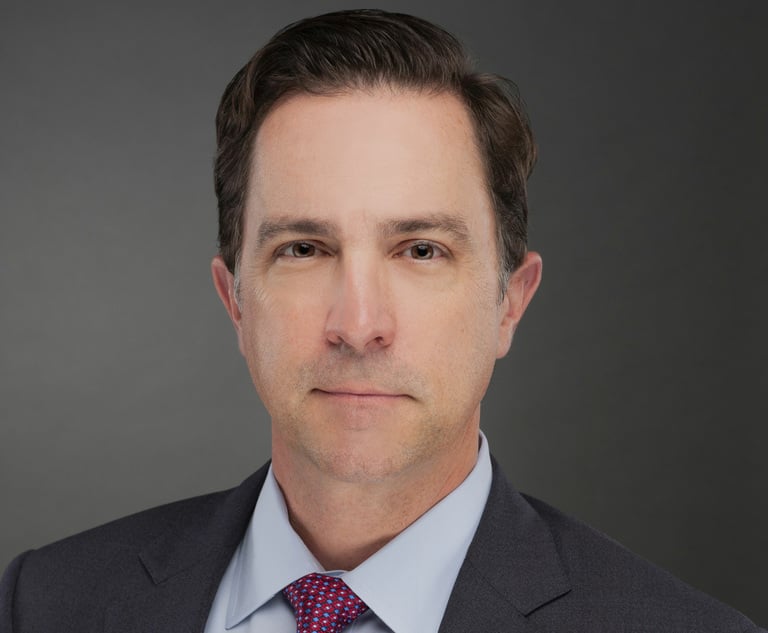Texas Among Nine State Bars Facing Free Speech Suits Over Law Firm Name Rules
The federal lawsuits argue that wholesale prohibitions on the use of trade names as a firm name are unconstitutional and should be abolished.
January 29, 2020 at 12:00 PM
5 minute read
The original version of this story was published on Daily Report
 The State Bar of Texas, Austin. (Photo: Joel Salcido)
The State Bar of Texas, Austin. (Photo: Joel Salcido)
A Utah law firm known as LawHQ has filed nine lawsuits against states, including Texas, that prohibit the use of law firm trade names.
The federal lawsuits, which also target bar officials in Indiana, Mississippi, Nebraska, New Jersey, New York, Ohio, Rhode Island and Georgia, argue that wholesale prohibitions on the use of trade names as a firm name are unconstitutional and should be abolished.
LawHQ filed the suits Jan. 23 along with its principal, Thomas Alvord. That firm is interested in opening offices in other parts of the country but would not be allowed to operate under the naming rules in those states, the suits state.
"It's time for the legal profession to recognize that prohibiting a trade name is unconstitutional," Alvord said in a statement. "We have the right to call ourselves whatever we like, as long as it is not misleading. How does it help the average person to try to distinguish between 20 firms who all are named 'Jones'?"
LawHQ's suit in the U.S. District Court for the Western District of Texas is against the state bar's Seana Willing, in her official capacity as Chief Disciplinary Counsel of the Texas Office of Chief Disciplinary Counsel.
The suit targets Texas Disciplinary Rule of Professional Conduct 7.01(a), which prohibits law firms from advertising their services using trade names. Texas stands apart from almost every other state in forbidding the practice.
"The rule is a holdover from professionalism standards drafted in the early twentieth century, when courts did not yet recognize commercial speech as a form of protected expression and when almost all forms of lawyer advertising were forbidden," the suit claims.
"Nobody could claim that consumers would be better protected if trade names were prohibited in other industries—if the law required Facebook, for example, to be called Mark Zuckerberg & Associates or Apple to be called Jobs & Wozniak," the suit says. "Law firms are no different. On the contrary, prohibiting firms from using trade names, if anything, makes their names more misleading by replacing memorable and easily distinguishable firm names with the names of partners who are often retired, deceased, or unlicensed."
Restrictions on law firm trade names were common before 1977, when the Supreme Court overturned Arizona's ban on lawyer advertising, the suit says. In response to that decision, the American Bar Association issued a new Model Rule 7.5 that allowed trade names to be used by lawyers in private practice, subject to certain restrictions. In 1987 the Federal Trade Commission advised state bar associations that banning trade or fictitious names, regardless of whether there has been any showing of deception, may deprive consumers of valuable information, increase consumer search costs and lessen competition, the suit said.
The ABA eliminated its Model Rule 7.5 entirely in 2019, concluding that the issues addressed by that rule were better addressed by Rule 7.1′s prohibition on false and misleading advertising, the suit states. Most states have followed suit, with the exception of the nine states mentioned in the lawsuits, according to the complaint.
In New Jersey, Charles Centinaro, director of the Office of Attorney Ethics, is the sole defendant in the New Jersey suit. LawHQ sought an assurance from Centinaro in October 2019 that it could operate in New Jersey without threat of discipline, but it received no response, said Robert Donaher of Herold Law in Warren who represents the Utah firm along with Beck and Evans.
LawHQ focuses on "protecting consumers from the proliferation of telephone spam," and it employs local lawyers outside its home state of Utah, the suit said.
LawHQ is not the only law firm to bristle at New Jersey's naming rules. On Jan. 2, a group of former Flaster/Greenberg partners announced the formation of a new firm called Lex Nova Law, with offices in Philadelphia, Cherry Hill, New York and Washington.
The firm name "means 'new law' in Latin and represents a new beginning," Lex Nova said in an announcement of its opening. But to comply with New Jersey's naming regulations, the firm's official name is Lex Nova Law, Eizen/Goldstein/Roderick/Skinner/Spirgel, said one of the firm's principals, Peter Spirgel. The firm is not involved in the LawHQ suit.
"The New Jersey rule should change as it is outdated and makes no sense," Spirgel said. "I understand that there is an interest in prohibiting names such as 'Best Law Firm,' but requiring the name of a current or former attorney to be included in the firm's name is unnecessary in my opinion."
MaryAnn Spoto, a spokeswoman for New Jersey's Administrative Office of the Courts, declined to comment about the LawHQ suit.
Charles Toutant writes for the New Jersey Law Journal, a Daily Report affiliate where a version of this article first appeared.
This content has been archived. It is available through our partners, LexisNexis® and Bloomberg Law.
To view this content, please continue to their sites.
Not a Lexis Subscriber?
Subscribe Now
Not a Bloomberg Law Subscriber?
Subscribe Now
NOT FOR REPRINT
© 2025 ALM Global, LLC, All Rights Reserved. Request academic re-use from www.copyright.com. All other uses, submit a request to [email protected]. For more information visit Asset & Logo Licensing.
You Might Like
View All
O'Melveny, White & Case, Skadden Beef Up in Texas With Energy, Real Estate Lateral Partner Hires
5 minute read
Chamberlain Hrdlicka Taps a New Leader as Firm Follows Succession Planning Path
3 minute read
Law Firms Are 'Struggling' With Partner Pay Segmentation, as Top Rainmakers Bring In More Revenue
5 minute read
Trending Stories
- 1‘High Demand’: Former Trump Admin Lawyers Leverage Connections for Big Law Work, Jobs
- 2Considerations for Establishing or Denying a Texas Partnership to Invest in Real Estate
- 3In-House AI Adoption Stalls Despite Rising Business Pressures
- 4Texas Asks Trump DOJ to Reject Housing Enforcement
- 5Ideas We Should Borrow: A Legislative Wishlist for NJ Trusts and Estates
Who Got The Work
J. Brugh Lower of Gibbons has entered an appearance for industrial equipment supplier Devco Corporation in a pending trademark infringement lawsuit. The suit, accusing the defendant of selling knock-off Graco products, was filed Dec. 18 in New Jersey District Court by Rivkin Radler on behalf of Graco Inc. and Graco Minnesota. The case, assigned to U.S. District Judge Zahid N. Quraishi, is 3:24-cv-11294, Graco Inc. et al v. Devco Corporation.
Who Got The Work
Rebecca Maller-Stein and Kent A. Yalowitz of Arnold & Porter Kaye Scholer have entered their appearances for Hanaco Venture Capital and its executives, Lior Prosor and David Frankel, in a pending securities lawsuit. The action, filed on Dec. 24 in New York Southern District Court by Zell, Aron & Co. on behalf of Goldeneye Advisors, accuses the defendants of negligently and fraudulently managing the plaintiff's $1 million investment. The case, assigned to U.S. District Judge Vernon S. Broderick, is 1:24-cv-09918, Goldeneye Advisors, LLC v. Hanaco Venture Capital, Ltd. et al.
Who Got The Work
Attorneys from A&O Shearman has stepped in as defense counsel for Toronto-Dominion Bank and other defendants in a pending securities class action. The suit, filed Dec. 11 in New York Southern District Court by Bleichmar Fonti & Auld, accuses the defendants of concealing the bank's 'pervasive' deficiencies in regards to its compliance with the Bank Secrecy Act and the quality of its anti-money laundering controls. The case, assigned to U.S. District Judge Arun Subramanian, is 1:24-cv-09445, Gonzalez v. The Toronto-Dominion Bank et al.
Who Got The Work
Crown Castle International, a Pennsylvania company providing shared communications infrastructure, has turned to Luke D. Wolf of Gordon Rees Scully Mansukhani to fend off a pending breach-of-contract lawsuit. The court action, filed Nov. 25 in Michigan Eastern District Court by Hooper Hathaway PC on behalf of The Town Residences LLC, accuses Crown Castle of failing to transfer approximately $30,000 in utility payments from T-Mobile in breach of a roof-top lease and assignment agreement. The case, assigned to U.S. District Judge Susan K. Declercq, is 2:24-cv-13131, The Town Residences LLC v. T-Mobile US, Inc. et al.
Who Got The Work
Wilfred P. Coronato and Daniel M. Schwartz of McCarter & English have stepped in as defense counsel to Electrolux Home Products Inc. in a pending product liability lawsuit. The court action, filed Nov. 26 in New York Eastern District Court by Poulos Lopiccolo PC and Nagel Rice LLP on behalf of David Stern, alleges that the defendant's refrigerators’ drawers and shelving repeatedly break and fall apart within months after purchase. The case, assigned to U.S. District Judge Joan M. Azrack, is 2:24-cv-08204, Stern v. Electrolux Home Products, Inc.
Featured Firms
Law Offices of Gary Martin Hays & Associates, P.C.
(470) 294-1674
Law Offices of Mark E. Salomone
(857) 444-6468
Smith & Hassler
(713) 739-1250






